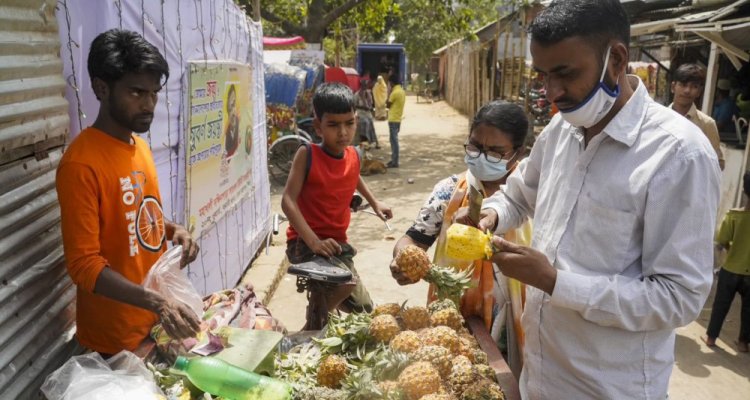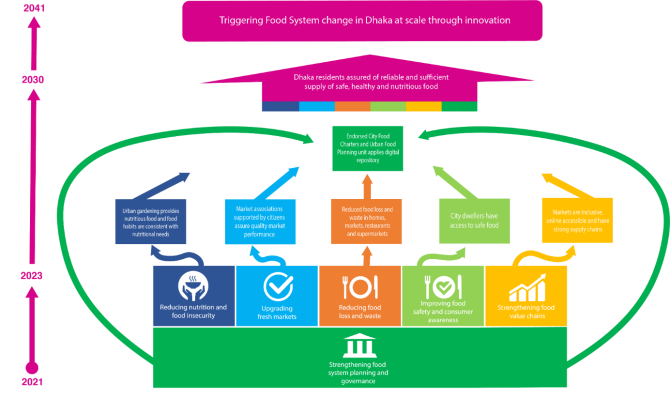
Project
Improving Dhaka’s food system
Dhaka, the capital of Bangladesh, faces pressing problems in supplying its increasing population with affordable, safe and nutritious foods. Dhaka’s population has grown rapidly to over 20 million. It will soon be the third largest metropolitan area in the world. One-fifth of Dhaka's population lives below the poverty line and receives inadequate nutrition. There is also a lack of availability and access to healthy food. Food safety issues pose a serious threat to public health. These issues have all become even more pressing during the COVID-19 pandemic.
In a unique food system approach, institutes of Wageningen University & Research have integrated their expertise on diverse aspects that include food system governance, consumer behavior, food economy, agricultural production, logistics, spatial planning, and impact assessments of interventions. In a joint effort with the Food and Agricultural Organisation of the UN (FAO) as lead implementor and local stakeholders, WUR contributes to finding integrated solutions to address Dhaka's present and future food needs.
"A food system approach means that we consider all the factors that determine what the people living in Dhaka get on their plates," explains Marion Herens, who coordinates the Dhaka food system project at WUR. In the project WUR contributes to the implementation trajectories of the Food and Agriculture Organization (FAO) of the UN, by building the knowledge base and capacity for food systems transformation in Dhaka.
Focus is on the Dhaka Metropolitan area, which comprises four Cities clustered together: Dhaka North, Dhaka South, Narayangaj, and Gazipur. "At WUR, we have the combined expertise required to advise on the complex challenges of Dhaka's food system," says Herens. "We have combined these into an integrated approach to help FAO to empower stakeholders with knowledge in different key areas within the food system, and support the collaboration needed at different levels; with the local government and different stakeholders within the cities. We also contribute to the capacity building and training needed for stakeholders to work on their own on real solutions."
Six thematic clusters
To ensure gender- and nutrition sensitive action by the project, WUR developed a gender and a nutrition strategy and supports their implementation:
After a first phase of the project (2019-2021), it was decided to redesign the Dhaka Food Systems (DFS) project and, with all stakeholders, focus on six thematic clusters, that each consist of several initiatives leading to aimed outcomes.

Theme 1: Strengthening food systems planning and governance
This cluster is the glue that connects all DFS initiatives. Food system governance refers to the relationships and communication that exists between the government and other stakeholders, and the ways in which they work together to achieve common goals. In the first phase emphasis was placed on creating a city-level governance platform (the city working groups) on the food system. In the second the emphasis is on the metropolitan level. The key objective of the second phase is for the emergence of a Dhaka Food Agenda 2041.
- Food System Governance Self-Assessment Tool
- Website with interactieve GIS-tool
- Food system Foresight Dashboard
- Case Study Paper on the contribution of City Working Groups to Dhaka’s Food System Governance
- Summary case study: contribution of City Working Groups to Dhaka’s Food System Governance
- Video on a participatory Foresights and Scenarios process towards Dhaka’s Food Agenda 2041
- Workshop report: Dhaka Food Agenda 2041 Foresight and Scenario development
- Publication: Land use classification Bangladesh: combining and downscaling existing databases
- Video: Dhaka Food Agenda 2041 – A shared vision for Dhaka’s food system
Theme 2: Promoting nutrition and food security
The issue of impaired nutrition and food insecurity has become even more pressing during the COVID-19 pandemic as urban poor communities have suffered the worst of all. The combination of lost incomes, rising and fluctuating costs of food, and disruptions to regular service of food value chains, together with tenuous access to sufficient, safe, and nutritious food underscore that this is a weak point of the food system in need of support and new ideas.
Theme 3: Upgrading fresh markets
Fresh markets are recognized as an important nexus in the food system. The DFS program was able to build a strong partnership coalition including GAIN, the PROKAS project, BSafe Foundation, BFSA, and the World Bank, all contributing in their own way to upgrading fresh markets. Together with World Bank’s ambitious and well-resourced market upgrading initiative – in both Dhaka North and South – a second phase holds promise for a systemic and progressive upgrade of Dhaka’s fresh markets in terms of both the skills of market associations, market vendors and staff, as well as the infrastructure and services of markets. In addition consumers will have greater awareness and involvement in their markets’ management and conditions.
Theme 4: Reducing food loss and waste
This area of the food system has long been overlooked, but its importance becomes more and more evident as an issue that affects consumers and signals inefficiencies through the food system. Food loss can happen at any point between farms and markets, and in developing countries it happens mostly on farms and in transit, where cold storage and transportation facilities are limited. Food waste happens once consumers have purchased food, so it happens in homes, shops, restaurants, and other institutions.
- Study on anaerobic digestion of waste material
- Dhaka North City cooperation waste report
- Special edition: Reducing food waste and loss
- Central biodigester for fresh market waste in Dhaka
Theme 5: Improving food safety and consumer awareness
One of the most important entry points into food systems in Bangladesh is food safety. Food safety is an issue at the forefront of the public agenda and national and local governments are concerned about it and galvanized for action. Early during the project city officials and stakeholders unanimously prioritized food safety, we also discovered that the topic motivated the public to seek alternative ways of accessing food, and pushed the private and public sectors to improve themselves too.
Theme 6: Strengthening food value chains
One of the strong recommendations provided by EKN and the MTE for the second phase was the need to adopt a more holistic ‘food systems’ approach, and to extend our attention beyond the city limits, and encompass food value chains more broadly. Three additional initiatives have been proposed to strengthen food value chains, either at strategic moments, or along the entire length of the chain.
- Four reports
- Analysis of the mango value chain in Bangladesh: Towards a strategic action agenda for the Dhaka city corporations
- Analysis of the beef value chain in Bangladesh: Towards a strategic action agenda for the Dhaka city corporations
- Analysis of the mango value chain in Bangladesh: Towards a strategic action agenda for the Dhaka city corporations
- Mapping the onion value chain of Dhaka, Bangladesh
- Powerpoint: Most important findings
